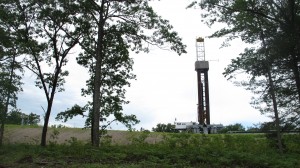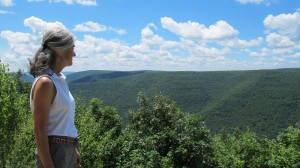On public land, a gas company takes private control
-
Marie Cusick
On any given day Bob Deering doesn’t know how much trouble he’ll have getting to and from his home. He lives on a mountain in Lycoming County and he’s routinely stopped and questioned by security guards. It’s been happening for the past six years– ever since the natural gas boom began.
“I’ve been coming up here with my grandparents since 1953,” he says. “But if I would have known in 2001 what I know now, I’d never have built a house up here.”
Deering expected to enjoy a quiet retirement. In the early 2000’s, he and his wife built a log home from a kit. Their property is surrounded by state forest and game land.
But in recent years their neighborhood has gotten noisy as gas companies drill wells, build pipelines, and move heavy equipment.
Nearly a third of Pennsylvania’s roughly 2 million acres of public forest land is already available for oil and gas development. Governor Corbett wants to lease even more land, but an environmental group is suing to try to stop him.
“Can I get down that road at all?”
Truman Run Road is the main way to Deering’s home. It’s owned by McHenry township– a rural community of 145 permanent residents. Although Truman Run is a public road, most of the time it’s controlled by a private security firm that works for the gas industry.
The road can handle two-way traffic with regular cars, but it’s not wide enough for cars and large trucks, so travelers often have to wait for clearance at the bottom or the top of the mountain.
“There are times you wait at the bottom for half an hour to come up,” says Deering. “Sometimes, I’m down there… hours.”
One of the ways gas companies have tried to limit their footprint in public forests is by utilizing one-way traffic on existing roads, instead of widening them or building new roads.
There are other ways Deering can get off the mountain, but those routes add a half-hour to his trip. A few winters ago, he was trapped at home for an entire day when a truck was stuck on the main road. The alternate routes– state forest roads– weren’t maintained at the time and weren’t safe in the bad weather.
Lately he’s had health issues and worries about getting to the doctor’s office on time.
“If I have an appointment, how much extra time do I leave– 15 minutes? An hour?” he wonders. “Can I get down that road at all?”
Safety and security
The McHenry township supervisors say they’ve tried to work out a compromise. Residents can go up and down the road four hours a day– two in the morning and two in the evening.
The rest of the time, the security guards are in charge.
“It has been working well. We don’t hear many complaints,” says supervisor Steve Dawson. “They have certain times for ‘down’ traffic and ‘up’ traffic for the people who have to go to work. Occasionally there’s problems with that, like in bad weather. But during the day–it doesn’t mean they can’t come up or down–it means they might have to wait for a load of trucks.”
Earlier this summer, Deering took StateImpact Pennsylvania on a tour of the area around his home. Many of the trucks we saw were headed to an active drilling site operated by Warren County-based Pennsylvania General Energy (PGE). It’s in a joint venture with a subsidiary of Exxon Mobil.

Marie Cusick/ StateImpact Pennsylvania
A PGE drill rig in the Tiadaghton State Forest. Our photos of this rig prompted two security guards to follow us through the forest for several hours.
After a few minutes of taking photos of the drill rig from the public road, a man appears and asks for our names. We tell him who we are and what we’re doing.
The man won’t identify himself but says he’s copying down Deering’s license plate.
“I was told you have to have permission to photograph,” he says.
“From whom?” Deering asks.
“I was just told,” the man says. “I’m just asking you if you have permission.”
He leaves, and a few minutes later another security guard arrives. We ask him if it’s OK to take photos from the road. He doesn’t answer. He uses his phone to take photos of us and walks away.
The security firm, Gas Well Security, didn’t respond to several requests to comment for this story. PGE declined an interview request but sent a statement saying its focus is on the safety of workers and visitors:
“Any effort by contracted personnel to engage people near our operations is focused on these goals of safety and security and not intended to impede use of public lands.”
As Deering took us along the public roads near his home over the next several hours, two security guards continually trailed us. None of them mentioned safety or security concerns.
Access denied
Other residents have similar stories. Attorney Mark Givler lives at the bottom of the mountain, along the Pine Creek. He’s an avid hiker and says the gas industry has changed his way of life. When the drilling boom first began, guards blocked him from getting to some of his favorite scenic vistas in the Tiadaghton State Forest.
“When I first tried to get to the scenic views back in 2007, I was arrested in my progress by these security people,” says Givler. “They absolutely denied me access to these public vistas.”
Angered by his experience, Givler wrote letters to then-Governor Ed Rendell and other state officials including the Department of Conservation and Natural Resources, which manages public forests.
The agency responded saying it has neither the personnel, training, nor budget manage security. Dan Devlin heads the department’s Bureau of Forestry and says things have gotten better.
“I would be the first to admit that very early on, we had a lot of overaggressive security folks that were making things more difficult than they should have been.”
Devlin says the state still leaves security up to gas companies and safety is important, but complaints about public access have dwindled in recent years.
It’s true that things have changed.
Hikers, like Cindy Bower, can go to those vistas again.
She parks her car a quarter-mile away—the road is closed to traffic now—although industry vehicles are allowed. The path takes her past construction equipment and a fenced-off impoundment pond.

Marie Cusick/ StateImpact Pennsylvania
Cindy Bower looks out over the Pine Creek Valley. These scenic vistas were temporarily closed to the public due to gas development.
In the past, she could drive up to the views with her family.
They can’t join her anymore.
“None of my immediate family can walk here,” she says. “For various reasons of mobility having to do with replacement joints, arthritis, and age.”
Bower is a member of the Lycoming County Planning Commission and has watched the gas industry grow in the state forest system.
“Sometimes when you come down a road like this, you’ll get stopped by a vehicle with a person that says, ‘Well what are you doing here?’ I shouldn’t have to be asked what I’m doing on public land.”
Bower is also a board member of the Pennsylvania Environmental Defense Foundation—the group suing Governor Corbett to prevent further gas leasing on public land.
A ruling is expected this winter.
Meanwhile, with more development planned near his home, Bob Deering and his wife are thinking of moving.
“She wants [to get] out of here period,” he says of his wife. “Because she deals with the traffic every day. She just doesn’t feel safe anymore.”
















